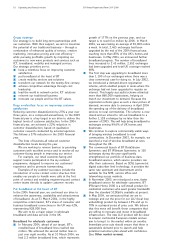BT 2004 Annual Report Download - page 21
Download and view the complete annual report
Please find page 21 of the 2004 BT annual report below. You can navigate through the pages in the report by either clicking on the pages listed below, or by using the keyword search tool below to find specific information within the annual report.Appeals
One of the main features of the new regulatory
framework is that full appeals on the merits are now
available against regulatory decisions. Consequently,
appeals can be made against matters such as:
&SMP, SMP apparatus (see above) and USO
designations
&the setting, modification and revocation of
conditions
&enforcement actions, including the imposition of a
penalty.
Any person affected by a decision may appeal to
the Competition Appeal Tribunal. However, the
Tribunal must refer on to the Competition Commission
for determination any matters in any appeal which
relates to price controls.
In an appeal by BT, the Competition Appeal
Tribunal has ruled that it was wrong for Oftel to force
us to supply mobile companies with the private circuits
that connect their cell sites to their main networks
more cheaply, on the basis that such circuits were
interconnection, than we had done historically.
Competition
The competitive environment
The UK telecommunications market is fully open and
highly competitive.
Although it is some years since the
Telecommunications Act abolished the monopoly of
the former statutory corporation, British
Telecommunications, obligations placed on BT,
including pricing regulation, network access, non-
discrimination obligations and the requirement to
provide universal service, are generally more onerous
than for other providers of electronic communications
networks and services.
Competition and the UK economy
The growth of mobile over the last decade has been a
major factor in shaping the UK’s telecommunications
landscape. Mobile now accounts for approximately
30% of the total UK voice minutes. BT’s market share
of the total UK voice market including mobile is
estimated to be approximately 40%.
BT’s share of the residential fixed-voice market, as
measured by the volume of fixed-to-fixed voice
minutes, declined to an estimated 70% in the 2004
financial year, compared with an estimated 73% in the
2003 and 2002 financial years. CPS has been one of
the contributors to the loss of share in the fixed-voice
market. We estimate that BT had 42% of the market
for business fixed-voice calls in the 2004 financial year,
compared with an estimated 45% and 49% in the
2003 and 2002 financial years, respectively.
The estimated market shares are based on our
actual minutes, market data provided by Ofcom and
an extrapolation of the historical market trends.
We also estimate that BT has supplied
approximately 80% of exchange lines in the UK during
the three years under review.
The growth in cable operators’ networks in the UK
has historically had an adverse effect on BT’s share of
the residential market as a result of increasing
competition from these cable operators. However, in
the 2004 financial year, BT grew its residential
customer base by 190,000. Current and future
wholesale line rental arrangements will allow BT’s
fixed-line customers to move PSTN lines to other
operators which are expected to be the source of more
competition in future.
Since 2000, we have been required to provide
other operators with the use of the lines connecting
BT’s local exchanges to our customers and to other
operators to install equipment in our exchanges (local
loop unbundling) (see Other market reviews).
Competition Act
In addition to telecommunications industry regulation,
BT is subject to general competition law.
By virtue of provisions in the Competition Act
1998, UK competition law is in line with European
Community law in prohibiting anti-competitive
agreements, concerted practices and the abuse of a
dominant market position. In the case of electronic
communications, Ofcom has concurrent investigatory
and enforcement powers with the Office of Fair
Trading. Breach of the relevant prohibitions could lead
to fines of up to 10% of relevant turnover in the UK for
each year of infringement (up to a maximum of three
years) and/or result in claims for damages in the civil
courts. A company may also be ordered to cease an
infringing activity. There is an independent mechanism
for appeals to the Competition Appeal Tribunal against
decisions under the Competition Act.
The Competition Appeal Tribunal is hearing
Freeserve’s appeal against Ofcom’s decision in which
BT was found not to have infringed the prohibition on
abuse of a dominant position in relation to
BT Openworld’s consumer broadband products.
Enterprise Act
The Enterprise Act 2002 aims to give more
independence to the competition authorities, to reform
insolvency and bankruptcy laws and to tackle trading
practices that harm consumers.
The key provisions of the Enterprise Act, including
the new cartel offence and the section on director
disqualification, entered into force on 20 June 2003.
It is now a criminal offence, punishable by
imprisonment or a fine, or both, to engage in cartel
activity. In addition, where companies infringe UK or
EC competition law, company directors can be
disqualified from acting as such for a maximum period
of 15 years.
Pricing regulation
Fixed network
We are subject to price controls on our fixed network
services in the UK at two levels: retail and network.
Fixed network competitors are generally not subject to
direct price controls, although there are some controls
on mobile network operators.
Retail price controls
We are subject to two sets of UK retail price controls,
one on certain public-switched telephony call charges
20 Operating and financial review BT Annual Report and Form 20-F 2004
























